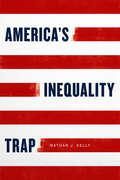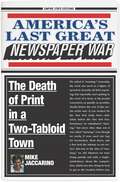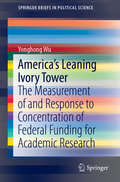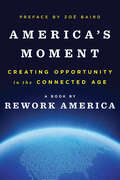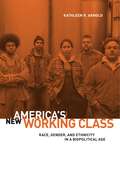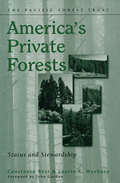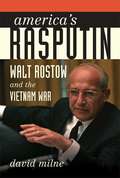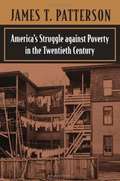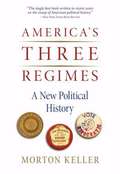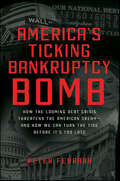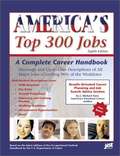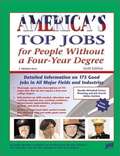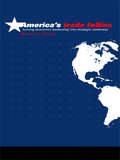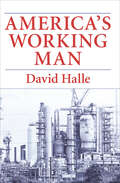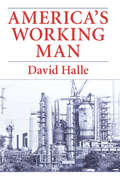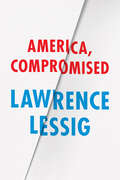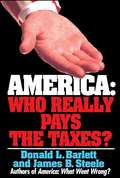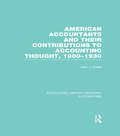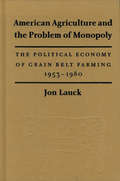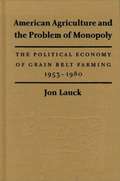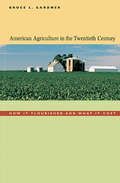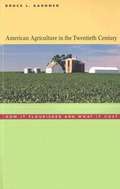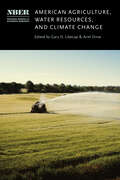- Table View
- List View
America's Inequality Trap (Chicago Studies in American Politics)
by Nathan J. KellyThe gap between the rich and the poor has grown dramatically in the United States and is now at its widest since at least the early 1900s. While by most measures the economy has been improving, soaring cost of living and stagnant wages have done little to assuage economic anxieties. Conditions like these seem designed to produce a generation-defining intervention to balance the economic scales and enhance opportunities for those at the middle and bottom of the country’s economic ladder—but we have seen nothing of the sort. Nathan J. Kelly argues that a key reason for this is that rising concentrations of wealth create a politics that makes reducing economic inequality more difficult. Kelly convincingly shows that, when a small fraction of the people control most of the economic resources, they also hold a disproportionate amount of political power, hurtling us toward a self-perpetuating plutocracy, or an “inequality trap.” Among other things, the rich support a broad political campaign that convinces voters that policies to reduce inequality are unwise and not in the average voter’s interest, regardless of the real economic impact. They also take advantage of interest groups they generously support to influence Congress and the president, as well as state governments, in ways that stop or slow down reform. One of the key implications of this book is that social policies designed to combat inequality should work hand-in-hand with political reforms that enhance democratic governance and efforts to fight racism, and a coordinated effort on all of these fronts will be needed to reverse the decades-long trend.
America's Last Great Newspaper War: The Death of Print in a Two-Tabloid Town
by Mike JaccarinoNAMED A BEST BOOK OF THE WEEK BY THE NEW YORK POSTALSO AVAILABLE AS AN AUDIOBOOKA from-the-trenches view of New York Daily News and New York Post runners and photographers as they stop at nothing to break the story and squash their tabloid arch-rivals.When author Mike Jaccarino was offered a job at the Daily News in 2006, he was asked a single question: “Kid, what are you going to do to help us beat the Post?” That was the year things went sideways at the News, when the New York Post surpassed its nemesis in circulation for the first time in the history of both papers. Tasked with one job—crush the Post—Jaccarino here provides the behind-the-scenes story of how the runners and shooters on both sides would do anything and everything to get the scoop before their opponents.The New York Daily News and the New York Post have long been the Hatfields and McCoys of American media: two warring tabloids in a town big enough for only one of them. As digital news rendered print journalism obsolete, the fight to survive in NYC became an epic, Darwinian battle. In America’s Last Great Newspaper War, Jaccarino exposes the untold story of this tabloid death match of such ferocity and obsession its like has not occurred since Pulitzer– Hearst.Told through the eyes of hungry “runners” (field reporters) and “shooters” (photographers) who would employ phony police lights to overcome traffic, Mike Jaccarino’s memoir unmasks the do-whatever-it-takes era of reporting—where the ends justified the means and nothing was off-limits. His no-holds-barred account describes sneaking into hospitals, months-long stakeouts, infiltrating John Gotti’s crypt, bidding wars for scoops, high-speed car chases with Hillary Clinton, O.J. Simpson, and the baby mama of a philandering congressman—all to get that coveted front-page story.Today, few runners and shooters remain on the street. Their age and exploits are as bygone as the News–Post war and American newspapers, generally. Where armies once battled, often no one is covering the story at all.Funding for this book was provided by: Furthermore: a program of the J. M. Kaplan Fund
America's Leaning Ivory Tower: The Measurement of and Response to Concentration of Federal Funding for Academic Research (SpringerBriefs in Political Science)
by Yonghong WuThis book will expand the body of literature on capacity-building in science and improve public understanding of the issues regarding geographical concentration of federal research funding. The federal government has been the primary sponsor of academic research in the U.S., and the peer-review system has been the primary mechanism for distributing federal government funding for research among universities. The peer-review system ensures the production of the best science by funding the most capable researchers in the country. As a result, federal research funding has been concentrated in high-capacity states where many of the most capable researchers reside. Despite official action - such as the implementation of the Experimental Program to Stimulate Competitive Research (EPSCoR), which targets low capacity jurisdictions for federal funding - the amount of resources going to each state for research is highly uneven. This book provides recommendations on how to improve policy design and program implementation for better research capacity-building outcomes. The book lends itself to a wide audience, as it does not focus entirely on high-level statistical analysis, but will have specific appeal to researchers in science policy, federal budgeting and higher education policy.
America's Moment: Creating Opportunity in the Connected Age
by Rework America Zoë BairdIt is time for a new conversation. Amid the biggest economic transformation in a century, the challenge of our time is to make sure that all Americans benefit from the wave of digital revolutions around the world that have permeated and upended modern life. Yet today's economic arguments seem stuck. We need a new vision of a hopeful future and a new action agenda. So many Americans are uncertain about the future. How can there be so many paths to opportunity with so few people traveling them? As a nation, we have to understand what is required to help Americans succeed now, and how to prepare our country for what comes next. We have been here before. A hundred years ago, America experienced the greatest economic transformation and technological revolution in its history. The transformation of the past twenty years--as the world has moved through the information era into the digital age--has turned our life and work upside down once again. It is a time of tremendous change but also of tremendous possibility. Rework America is a group of American leaders who know from experience the challenges we face--and the potential solutions. In America's Moment they suggest a practical agenda for an exciting future. It is illustrated by people who are already showing the way and includes actions Americans can take today in their own communities: preparing people to succeed, using the reach of the Internet and data to innovate jobs and to reach new markets all over the world, using technology to match employers and workers, and transitioning to a "no-collar" working world-- neither blue collar nor white collar. Set against the history of how Americans succeeded once before in remaking their country, America's Moment is about the future. It describes how the same forces of change--technology and a networked world--can become tools that can open opportunity to everyone.
America's New Working Class: Race, Gender, and Ethnicity in a Biopolitical Age
by Kathleen R. ArnoldToday’s political controversy over immigration highlights the plight of the working class in this country as perhaps no other issue has recently done. The political status of immigrants exposes the power dynamics of the “new working class,” which includes the former labor aristocracy, women, and people of color. This new working class suffers exploitation in advanced industrial countries as the social cost of capitalism’s success in a neoliberal and globalized political economy. Paradoxically, as borders become more open, they are also increasingly fortified, subjecting many workers to the suspension of law.In this book, Kathleen Arnold analyzes the role of the state’s “prerogative power” in creating and sustaining this condition of severe inequality for the most marginalized sectors of our population in the United States. Drawing on a wide range of theoretical literature from Locke to Marx and Agamben (whose notion of “bare life” features prominently in her construal of this as a “biopolitical” era), she focuses attention especially on the values of asceticism derived from the Protestant work ethic to explain how they function as ideological justification for the exercise of prerogative power by the state.As a counter to this repressive set of values, she develops the notion of “authentic love” borrowed from Simone de Beauvoir as a possible approach for dealing with the complex issues of exploitation in liberal democracy today.
America's Private Forests: Status And Stewardship
by John Gordon Laurie A. Wayburn Constance Best Pacific Forest TrustNearly 430 million acres of forests in the United States are privately owned, but the viability, and indeed the very existence, of these forests is increasingly threatened by population growth, sprawling urbanization, and patchwork development. Scientists, policymakers, and community leaders have begun to recognize the vital role of private forests in providing society with essential goods and services, from sustainable timber supplies to clean water. Yet despite the tremendous economic and ecological importance of private forests, information about their status and strategies for their protection have been in short supply.America's Private Forests addresses that shortcoming, presenting extensive data gathered from diverse sources and offering a concise overview of the current status of privately owned forests in the United States. As well as describing the state of private forests, the book sets forth detailed information on a wide range of approaches to conservation along with an action agenda for implementing those strategies likely to be most effective.Based on extensive research of existing literature as well as interviews and consultation with leading forestry and conservation experts, America's Private Forests is a unique sourcebook that offers a solid basis for discussion of threats to private forests along with an invaluable compendium of potential solutions. It will serve as an invaluable reference for those working to conserve and steward forest resources, including forest owners and their consultants, conservation organizations, and agency personnel, as well as researchers and students involved with issues of forestry, biodiversity, land use, and conservation.
America's Rasputin: Walt Rostow and the Vietnam War
by David MilneWalt Rostow's meteoric rise to power -- from Flatbush, Brooklyn, to the West Wing of the White House -- seemed to capture the promise of the American dream. Hailing from humble origins, Rostow became an intellectual powerhouse: a professor of economic history at MIT and an influential foreign policy adviser to John F. Kennedy and Lyndon B. Johnson. Too influential, according to some. While Rostow inspired respect and affection, he also made some powerful enemies. Averell Harriman, one of America's most celebrated diplomats, described Rostow as "America's Rasputin" for the unsavory influence he exerted on presidential decision-making. Rostow was the first to advise Kennedy to send U.S. combat troops to South Vietnam and the first to recommend the bombing of North Vietnam. He framed a policy of military escalation, championed recklessly optimistic reporting, and then advised LBJ against pursuing a compromise peace with North Vietnam. David Milne examines one man's impact on the United States' worst-ever military defeat. It is a portrait of good intentions and fatal misjudgments. A true ideologue, Rostow believed that it is beholden upon the United States to democratize other nations and do "good," no matter what the cost. America's Rasputin explores the consequences of this idealistic but unyielding dogma.
America's Social Health: Putting Social Issues Back on the Public Agenda
by Sandra Opdycke Marque-Luisa MiringoffCalling for a fundamental change in the focus of public policy in America, this book paints a vivid portrait of the nation's social health. Miringoff and Opdycke clearly show that social progress has stalled and the country's energies need to be directed at critical domestic issues in the years ahead.The authors propose a new agenda for monitoring America's social well-being built around sixteen key indicators of American life, such as infant mortality, teenage suicide, health insurance coverage, and affordable housing. They maintain that social conditions, like economic conditions, must be constantly monitored in order to have a clear sense of "how we are doing" as a society.The book builds on the work of the Institute for Innovation in Social Policy and argues that there needs to be a greater visibility for social issues - and a closer link between social reporting and public action - to better address the nation's social problems. It considers the critical role of the media in advancing public understanding of social issues, and examines important advances in the community indicators movement and international social reporting. Eye-opening and compelling, the book is a provocative centerpiece for policy debates and national initiatives on today's crucial domestic concerns.
America's Struggle against Poverty in the Twentieth Century
by James T. PattersonThis new edition of Patterson's widely used book carries the story of battles over poverty and social welfare through what the author calls the "amazing 1990s," years of extraordinary performance of the economy. He explores issues arising from the economic phenomenon-increasing inequality and demands for use of an improved poverty definition.
America's Three Regimes: A New Political History
by Morton KellerHailed in The New York Times Book Review as "the single best book written in recent years on the sweep of American political history," this groundbreaking work divides our nation's history into three "regimes," each of which lasts many, many decades, allowing us to appreciate as never before the slow steady evolution of American politics, government, and law. The three regimes, which mark longer periods of continuity than traditional eras reflect, are Deferential and Republican, from thecolonial period to the 1820s; Party and Democratic, from the 1830s to the 1930s; and Populist and Bureaucratic, from the 1930s to the present. Praised by The Economist as "a feast to enjoy" and by Foreign Affairs as "a masterful and fresh account of U. S. politics," here is a major contribution to the history of the United States - an entirely new way to look at our past, our present, and our future - packed with provocative and original observations about American public life.
America's Ticking Bankruptcy Bomb: How the Looming Debt Crisis Threatens the American Dream—and How We Can Turn the Tide Before It's Too Late
by Peter FerraraIn America’s Ticking Bankruptcy Bomb, conservative policy expert Peter Ferrara explores the issue that will be THE hot-button topic from now until the 2012 presidential election: the looming bankruptcy of the federal government of the United States of America. Providing indisputable evidence that the American welfare state, aggressively expanded by Barack Obama and the Democrats in Congress, is on the verge of rapid and total collapse, Ferrara offers concrete proposals for reforming entitlement programs along free market lines that will shift responsibility from centralized bureaucracies to individual Americans. For every concerned citizen, America’s Ticking Bankruptcy Bomb is a must-read—a blueprint for avoiding the impending catastrophe before it’s too late.
America's Top 300 Jobs, Eighth Edition: A Complete Career Handbook
by Michael FarrThe job descriptions and other information in this book are based on extensive research by the U.S. Department of Labor. The well-written text covers all major jobs held by about 90 percent of the workforce. Each description is packed with details, including skills required, education and training needed, working conditions, salaries, advancement opportunities, future growth, related jobs, and much more. This book's content offers practical information for career planning in an easy-to-use format. You can use the table of contents to quickly identify jobs that interest you. You will find all major occupations listed there and arranged within groups of similar jobs. And the "Tomorrow's Jobs" section provides a brief, helpful overview of labor market and industry trends. The right job can make an enormous difference in your career success and satisfaction. Whether you're exploring career or educational options, looking for a new job, or advancing in your career, this book will help. Employers, career counselors, and other professionals can also use its authoritative content for determining average wages, writing job descriptions, and accomplishing other important purposes.
America's Top Jobs For People Without A Four-Year Degree: Sixth Edition
by Michael FarrAmerica's Top Jobs for People Without a Four-Year Degree describes 190 major occupations that do not require a four-year degree. Knowing more about these jobs can help you plan your training and education, make a career choice or change, or find work with higher pay and more advancement potential. Each description includes details about the following: Significant Points Nature of the Work Working Conditions Employment Training, Other Qualifications, and Advancement Job Outlook Earnings Related Occupations Sources of Additional Information
America's Trade Follies: Turning Economic Leadership Into Strategic Weakness
by Bernard K. GordonAmerica's Trade Follies controversially argues that the global political economy is hardening into regional blocs, in North America, Latin America, Europe and the Asia Pacific, organized around a powerful economic base and suspicious of each other. Bernard K. Gordon's masterful analysis shows that this division threatens American prosperity by limiting US access to the world's richest and largest markets, and endangers US security by dividing the globe along economic and political lines. Provocative, original and stimulating this book is essential reading for all those interested in American politics, trade and international political economy.
America's Uninsured Crisis: Consequences for Health and Health Care
by Institute of MedicineWhen policy makers and researchers consider potential solutions to the crisis of uninsurance in the United States, the question of whether health insurance matters to health is often an issue. This question is far more than an academic concern. It is crucial that U.S. health care policy be informed with current and valid evidence on the consequences of uninsurance for health care and health outcomes, especially for the 45.7 million individuals without health insurance. From 2001 to 2004, the Institute of Medicine (IOM) issued six reports, which concluded that being uninsured was hazardous to people's health and recommended that the nation move quickly to implement a strategy to achieve health insurance coverage for all. The goal of this book is to inform the health reform policy debate--in 2009--with an up-to-date assessment of the research evidence. This report addresses three key questions: What are the dynamics driving downward trends in health insurance coverage? Is being uninsured harmful to the health of children and adults?Are insured people affected by high rates of uninsurance in their communities?
America's Working Man: Work, Home, and Politics Among Blue Collar Property Owners
by David Halle&“An unusually deep and wide-ranging study&” by a sociologist who spent years listening to and living among workers at a New Jersey chemical plant (Journal of American Studies). Over a period of six years during the late 1970s, at factory and warehouse, at the tavern across the road, in their homes and union meetings, on fishing trips and social outings, David Halle talked and listened to workers of an automated chemical plant in New Jersey&’s industrial heartland—white, male, and mostly Catholic. He has emerged with an unusually comprehensive and convincingly realistic picture of blue-collar life in America during this era. Throughout the book, Halle illustrates his analysis with excerpts of workers&’ views on everything from strikes, class consciousness, politics, job security, and toxic chemicals to marriage, betting on horses, God, home-ownership, drinking, adultery, the Super Bowl, and life after death. Halle challenges the stereotypes of the blue-collar mentality and provides a detailed, in-depth portrait of one community of workers at a time when it was relatively affluent and secure. &“Absorbing reading.&”—Business Week
America's Working Man: Work, Home, and Politics among Blue-Collar Property Owners
by David HalleOver a period of six years, at factory and warehouse, at the tavern across the road, in their homes and union meetings, on fishing trips and social outings, David Halle talked and listened to workers of an automated chemical plant in New Jersey's industrial heartland. He has emerged with an unusually comprehensive and convincingly realistic picture of blue-collar life in America. Throughout the book, Halle illustrates his analysis with excerpts of workers' views on everything from strikes, class consciousness, politics, job security, and toxic chemicals to marriage, betting on horses, God, home-ownership, drinking, adultery, the Super Bowl, and life after death. Halle challenges the stereotypes of the blue-collar mentality and argues that to understand American class consciousness we must shift our focus from the "working class" to be the "working man. "
America, Compromised: Five Studies In Institutional Corruption (Berlin Family Lectures)
by Lawrence Lessig“There is not a single American awake to the world who is comfortable with the way things are.” So begins Lawrence Lessig's sweeping indictment of contemporary American institutions and the corruption that besets them. We can all see it—from the selling of Congress to special interests to the corporate capture of the academy. Something is wrong. It’s getting worse. And it’s our fault. What Lessig shows, brilliantly and persuasively, is that we can’t blame the problems of contemporary American life on bad people, as our discourse all too often tends to do. Rather, he explains, “We have allowed core institutions of America’s economic, social, and political life to become corrupted. Not by evil souls, but by good souls. Not through crime, but through compromise.” Every one of us, every day, making the modest compromises that seem necessary to keep moving along, is contributing to the rot at the core of American civic life. Through case studies of Congress, finance, the academy, the media, and the law, Lessig shows how institutions are drawn away from higher purposes and toward money, power, quick rewards—the first steps to corruption. Lessig knows that a charge so broad should not be levied lightly, and that our instinct will be to resist it. So he brings copious, damning detail gleaned from years of research, building a case that is all but incontrovertible: America is on the wrong path. If we don’t acknowledge our own part in that, and act now to change it, we will hand our children a less perfect union than we were given. It will be a long struggle. This book represents the first steps.
America: Who Really Pays the Taxes?
by Donald L. BarlettAmerica: Who Really Pays the Taxes? is a disturbing, eye-opening look at a tax system gone out of control. Originally designed to spread the cost of government fairly, our tax code has turned into a gold mine of loopholes and giveaways manipulated by the influential and wealthy for their own benefit.
American Accountants and Their Contributions to Accounting Thought: 1900-1930 (Routledge Library Editions: Accounting)
by John J. KahleAccounting carries with its history a vast number of ideas which have slowly developed along with it. This volume relates this history as it took place during the first three decades of the twentieth century in the United States. In particular it deals with those individuals who were for the most part responsible for it. It was these pioneers who recorded their observations of the actual workings of the myriad adaptations and new devices which had slowly eased their way into accounting theory and practice in the USA in the early twentieth century.
American Agriculture and the Problem of Monopoly: The Political Economy of Grain Belt Farming, 1953-1980
by Jon K. LauckThe breathtaking number of mergers and joint ventures among agribusiness firms has left independent American farmers facing the power of an increasingly concentrated buying sector. The origin of farmers’ concern with such economic concentration dates back to protests against meatpackers and railroads in the late nineteenth century. Jon Lauck examines the dimensions of this problem in the American Midwest in the decades following World War II. He analyzes the nature of competition within meat-packing and grain markets. In addition, he addresses concerns about corporate entry into production agriculture and the potential displacement of a production system defined by independent family farms. Lauck also considers the ability of farmers to organize in order to counter the market power of large-scale agribusiness buyers. He explores the use of farmer cooperatives and other mechanisms which may increase the bargaining power of farmers. The book offers the first serious historical examination of the National Farmers Organization, which fully embraced the bargaining power cause in the postwar period. Lauck finds that independent farmers’ attempts at organization have been more successful than previously recognized, but he also shows that their successes have been undermined by the growing concentration and power of agri-business firms, justifying a new approach to antitrust law in agricultural markets.
American Agriculture and the Problem of Monopoly: The political economy of grain belt farming, 1953-1980
by Jon LauckThe breathtaking number of mergers and joint ventures among agribusiness firms has left independent American farmers facing the power of an increasingly concentrated buying sector. The origin of farmers’ concern with such economic concentration dates back to protests against meatpackers and railroads in the late nineteenth century. Jon Lauck examines the dimensions of this problem in the American Midwest in the decades following World War II. He analyzes the nature of competition within meat-packing and grain markets. In addition, he addresses concerns about corporate entry into production agriculture and the potential displacement of a production system defined by independent family farms. Lauck also considers the ability of farmers to organize in order to counter the market power of large-scale agribusiness buyers. He explores the use of farmer cooperatives and other mechanisms which may increase the bargaining power of farmers. The book offers the first serious historical examination of the National Farmers Organization, which fully embraced the bargaining power cause in the postwar period. Lauck finds that independent farmers’ attempts at organization have been more successful than previously recognized, but he also shows that their successes have been undermined by the growing concentration and power of agri-business firms, justifying a new approach to antitrust law in agricultural markets.
American Agriculture in the Twentieth Century: How It Flourished and What It Cost
by Bruce L. GardnerAmerican agriculture in the twentieth century has given the world one of its great success stories, a paradigm of productivity and plenty. Yet the story has its dark side, from the plight of the Okies in the 1930s to the farm crisis of the 1980s to today's concerns about low crop prices and the impact of biotechnology. Looking at U.S. farming over the past century, Bruce Gardner searches out explanations for both the remarkable progress and the persistent social problems that have marked the history of American agriculture. Gardner documents both the economic difficulties that have confronted farmers and the technological and economic transformations that have lifted them from relative poverty to economic parity with the nonfarm population. He provides a detailed analysis of the causes of these trends, with emphasis on the role of government action. He reviews how commodity support programs, driven by interest-group politics, have spent hundreds of billions of dollars to little purpose. Nonetheless, Gardner concludes that by reconciling competing economic interests while fostering productivity growth and economic integration of the farm and nonfarm economies, the overall twentieth-century role of government in American agriculture is fairly viewed as a triumph of democracy.
American Agriculture in theTwentieth Century: How It Flourished and What It Cost
by Bruce L. GardnerAmerican agriculture in the twentieth century has given the world one of its great success stories, a paradigm of productivity and plenty. Yet the story has its dark side, from the plight of the Okies in the 1930s to the farm crisis of the 1980s to today's concerns about low crop prices and the impact of biotechnology. Looking at U. S. farming over the past century, Bruce Gardner searches out explanations for both the remarkable progress and the persistent social problems that have marked the history of American agriculture. Gardner documents both the economic difficulties that have confronted farmers and the technological and economic transformations that have lifted them from relative poverty to economic parity with the nonfarm population. He provides a detailed analysis of the causes of these trends, with emphasis on the role of government action. He reviews how commodity support programs, driven by interest-group politics, have spent hundreds of billions of dollars to little purpose. Nonetheless, Gardner concludes that by reconciling competing economic interests while fostering productivity growth and economic integration of the farm and nonfarm economies, the overall twentieth-century role of government in American agriculture is fairly viewed as a triumph of democracy.
American Agriculture, Water Resources, and Climate Change (National Bureau of Economic Research Conference Report)
by Gary D. Libecap and and Ariel DinarA collection of the most advanced and authoritative agricultural-economic research in the face of increasing water scarcity. Agriculture has been critical in the development of the American economy. Except in parts of the western United States, water access has not been a critical constraint on agricultural productivity, but with climate change, this may no longer be the case. This volume highlights new research on the interconnections between American agriculture, water resources, and climate change. It examines climatic and geologic factors that affect the agricultural sector and highlights historical and contemporary farmer responses to varying conditions and water availability. It identifies the potential effects of climate change on water supplies, access, agricultural practices, and profitability, and analyzes technological, agronomic, management, and institutional adjustments. Adaptations such as new crops, production practices, irrigation technologies, water conveyance infrastructure, fertilizer application, and increased use of groundwater can generate both social benefits and social costs, which may be internalized with various institutional innovations. Drawing on both historical and present experiences, this volume provides valuable insights into the economics of water supply in American agriculture as climate change unfolds.
